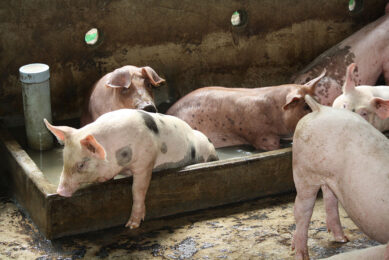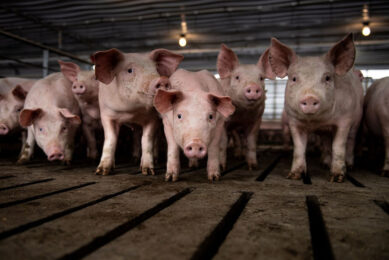US: Spending measure puts ‘GIPSA Rule’ on hold
Livestock and poultry organisations praised House lawmakers for approving an agriculture funding bill that prevents the U.S. Department of Agriculture (USDA) from finalising its proposed regulation on livestock and poultry marketing contracts.
The House voted 217-203 to pass legislation that funds USDA, the Food and Drug Administration and related agencies for fiscal 2012, which begins Oct. 1, but denies money for USDA’s Grain Inspection, Packers and Stockyards Administration (GIPSA) to promulgate the livestock and poultry marketing regulation.
Known as the GIPSA rule, the regulation was prompted by the 2008 Farm Bill. But, as 147 House members recently pointed out in a letter to Agriculture Secretary Tom Vilsack, the proposed rule goes well beyond the intent of Congress and includes provisions specifically rejected during debate on the Farm Bill. Lawmakers also criticised USDA’s failure to conduct an in-depth economic impact study of the proposal before it was published.
The livestock and poultry groups expressed strong support for the House action:
“The National Pork Producers Council is grateful that the House is requiring USDA to take a timeout on the GIPSA rule, which as proposed is bad for farmers and ranchers, bad for consumers and bad for rural America,” said NPPC President Doug Wolf. “And
contrary to the proclamations from some general farm groups, the vast majority of livestock and poultry producers strongly oppose this regulation, which would cost them millions of dollars and lead to thousands of lost jobs.”
“At a time when cattlemen are wondering why the federal government seems determined to put them out of business, it is encouraging to see the U.S. House of Representatives push back on government overreach into the private marketplace,” National Cattlemen’s Beef
Association President Bill Donald said. “If this rule is implemented, family farmers and ranchers have the most to lose with consumers riding shotgun. This rule will kill jobs and consumer choice and will depopulate rural America. Jobs on the ranch will be lost and trial
lawyers will be the only ones to reap rewards. The Senate needs to follow suit by stopping funding for this rule.”
“We commend the House for voting to rein in USDA’s GIPSA, which went far beyond its mandate from Congress in developing a rule on production and marketing of livestock and poultry,” said Mike Brown, president of the National Chicken Council. “We have consistently
urged USDA to go back to the drawing board and produce a rule that responds to its instructions from Congress rather than trying to destroy the existing system as the proposed rule does. Now we hope that the U.S. Senate will see the wisdom in the House action and follow suit.”
“The National Turkey Federation is very pleased with today’s action by the House. After careful examination, our processor and grower members concluded the proposed GIPSA marketing rule will result in job losses and negatively impact turkey farmers in a variety of ways, including limiting their ability to enter into certain production and marketing agreements,” said NTF President Joel Brandenberger. “The more than 1,000 family farmers who raise turkeys in this country rely on production and marketing contracts to make a living.
If the final rule were implemented, it could result in a fundamental change in the way turkeys are raised in this country, a change that may not benefit farmers. This rule is so flawed it can’t be fixed, and Congress is right to try and scrap it, insisting that GIPSA go back to the specific provisions agreed to in the 2008 Farm Bill.”
Said American Meat Institute President J. Patrick Boyle: “We appreciate the House of Representatives’ recognition that the proposed GIPSA rule is a costly and misguided regulation that ignores its congressional mandate and court rulings from across the land. We hope that the Senate will take the same action so that USDA will do what it appears reluctant to do: write a rule that is consistent with congressional intent and that will not force meat and poultry companies and livestock producers across the country to dismantle the model that has made our U.S. meat and poultry production system competitive and the envy of the world.”
“Congress is exactly right to ask that USDA give its proposed rule a reassessment,” said National Meat Association CEO Barry Carpenter. “The negative consequences of not doing so will have an enormous economic impact on the industry and be felt disproportionately by innovative, independent operators who rely on marketing arrangements to create a unique product.”
The organisations consistently have criticised the proposed USDA regulation, pointing out that it would restrict marketing agreements between producers and processors, dictate the terms of production contracts, require additional paperwork, create legal uncertainty and limit producers’ ability to negotiate better prices for the animals they sell.
According to a study conducted by Informa Economics, the GIPSA rule would result in job losses of nearly 23,000, with an annual drop in gross domestic product by as much as $1.56 billion and a yearly loss in tax revenues of $359 million.
The study also found that the regulation would impose on the livestock and poultry industries “ongoing and indirect” costs – eventually borne by producers and consumers – of more than $1.64 billion, including nearly $880 million to the beef industry, more than $400 million to the pork industry and almost $362 million to the poultry industry.
A study by John Dunham and Associates estimated the proposal’s costs to be far higher than USDA initially suggested. Those findings are available here.
Join 18,000+ subscribers
Subscribe to our newsletter to stay updated about all the need-to-know content in the pigsector, three times a week. Beheer
Beheer










 WP Admin
WP Admin  Bewerk bericht
Bewerk bericht